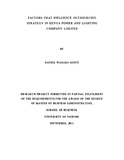| dc.description.abstract | Faced with global competition and increased customer awareness, companies have been
forced to adopt cutting-edge strategies to survive in the turbulent environment. Managers
need to use only those practices that ensure customer needs are addressed and met in
time. Supply chain management has been a norm for many firms with outsourcing being
a key element in this process. Managers have limited resources which require to be
optimized for maximum output. Firms have therefore to continuously consider the
advantages and disadvantages of producing goods and services in-house. Outsourcing has
attracted huge attention from many firms as it offers a quick solution in cutting costs and
most importantly allows the firm to only deal with those activities that are core to the
organization. Business support and non-core activities are better handled by firms who
are specialized in specific areas.
This case study sought to determine the factors that influence outsourcing strategy in the
Kenya Power and Lighting Company limited. Data was collected by use of an interview
guide and from documents obtained internally within the firm. The interviewer had a
face-to-face interview with the respondents who were managers and functional heads at
the firm. Eighteen interviews were carried out before a consistent view could be obtained
from the respondents.
From the findings of the study, KPLC outsourced several activities. All departments
within the firm outsourced some of their processes. Human Resources and
administration, and Distribution departments practiced outsourcing more than the other
departments in KPLC. The study revealed that, outsourcing was used in KPLC to cut on
vi
costs emanating from human labour, accelerate electricity connection to the huge Kenyan
market and to allow the firm to concentrate on the core activities. KPLC usually made the
decision to outsource by considering cost, time duration and the strategic implications of
outsourcing. The study revealed that some partnerships with outsourced firms have lead
to management consultancy services being extended to employees to participate abroad
which is a form of diversification of business. It also revealed that supervising the
outsourced firms in KPLC is a big challenge which requires a refined approach. | en_US |



